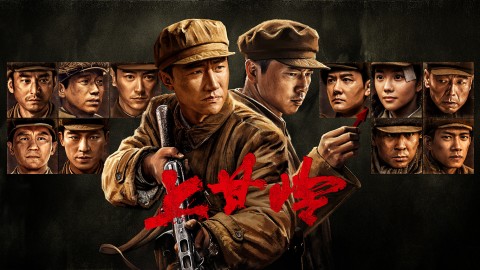Episode 18 recap: Liu San Niang was surrounded, and the Seven Righteous Ones cut their robes and fled in different directions.
Liu San Niang held her sword and ran wildly, but ultimately, she was surrounded. Soon after, Wu Lian appeared with Xie Zhi Hui, making the enemy even more jealous. Wu Lian teased Liu San Niang, suggesting they return to the Yanyu Embroidered Tower. Liu San Niang swung her sword towards Wu Lian, but in the next moment, she was knocked down by a guard beside her.
Seven years later, Meng Wan caressed the tombstone of Rulan, contemplating the words spoken by the abbot of the Qingshui An Temple. Bringing up past events, if innocent people were implicated, it would be Meng Wan's fault. However, if she had to give up everything she had fought for over the years because of a mistake, she felt unwilling to do so. Meng Wan stood up, gazing into the distance, lost in thought.
The incident with Zheng Da Niang Zi worried Meng Wan even more. She feared that if she continued to be entangled with Wu Lian, more people would be harmed, which was not what she wanted to see. However, San Niang believed that sacrifices are inevitable when great things are accomplished, and Tian Xiao Ling's role in bringing down Wu Lian was crucial—she should sacrifice herself for justice. Upon hearing this, Li Chun Feng next to them angrily smashed his wine cup on the ground, insulting San Niang as a lowly woman. The atmosphere became tense, and Meng Wan hurriedly interrupted their conversation.
On this day, someone delivered a secret letter, inviting San Niang to Tian Shui Tea House. However, only Meng Wan and their group knew San Niang's whereabouts in Huai Zhou City. Who could it be? To unravel the mystery, San Niang went alone to the Tian Shui Tea House for the appointment. As she suspected, the person who invited her was Wu Lian. Not only did Wu Lian know San Niang's whereabouts, but he also knew the secrets of all seven of them, even the details of their conversations in the courtyard.
After a long time, San Niang returned to the courtyard, only to be stared at by the others. It turned out that Li Chun Feng saw San Niang meeting with Wu Lian and suspected her of betrayal. San Niang sneered, recounting today's events in detail and bluntly stating that some of them had already been bought off by Wu Lian. As soon as these words were spoken, doubts arose in the hearts of the seven individuals, each pointing out the person they suspected. In the end, the seven of them dispersed without harmony.
That night, San Niang packed her belongings and prepared to return to Xunzhou City. Meng Wan tried to persuade her, but it was in vain. Helpless, San Niang asked Liu Xin to keep an eye on the surroundings of the courtyard to find out who the traitor was. Liu Xin wandered through the bamboo forest and accidentally discovered San Niang, leading him to suspect her. San Niang rolled her eyes and questioned why she would eavesdrop if she were a spy. So, they decided to work together and guard the courtyard.
Before long, San Niang spotted a suspicious woman and quietly followed her. As a result, she overheard Wu Lian's next move—tomorrow, Wu Lian would head north to seek support of 300,000 troops. San Niang quickly left and informed Meng Wan of this information. However, in the end, San Niang decided to leave. Just before leaving, she handed a pair of shoes to Meng Wan and asked her to give them to Liu Xin.
Back in Xunyang City, when San Niang saw the familiar peacock and the longing Yuan Mei, she felt a sense of belonging. She discussed the situation in the capital with Yuan Mei and suddenly realized that the 300,000 troops Wu Lian mentioned referred to the Imperial Army. Now, San Niang was faced with a dilemma. She had to ask Yuan Mei whether she should go to the capital, knowing that she might never return. Yuan Mei simply advised her that if her heart was tied to it, she should go, and if she couldn't come back, she would go search for her together with the peacock.
Upon entering the capital, Wu Lian headed straight to the Dali Temple, apparently looking for an acquaintance. After arriving in the capital, San Niang first sought out her old friend Luo Qiong and asked her for help to enter the Forbidden Army Camp. Although Luo Qiong didn't know the Forbidden Army, she knew some courtesans. As a result, San Niang infiltrated the camp and uncovered the connection between Wu Lian and the Forbidden Army. She quickly wrote down what she had heard and entrusted Luo Qiong to send it out. To protect Luo Qiong, San Niang had to take risks.
Luo Qiong rushed out of the camp and collided with Liu Xin. Since Luo Qiong had also stayed in Huaizhou City in the past, she naturally recognized Liu Xin. Following San Niang's instructions, she handed him the secret letter. Upon receiving the news, Meng Wan couldn't understand why Wu Lian, a high-ranking official in the Zhi Ma Hall of the Imperial Palace, would go to such lengths to seek this position. After much deliberation, the only possibility was that Wu Lian's true target was the Right Temple of the Dali Temple—the specialized court for handling criminal cases of the capital's officials.



This is just a theatrical story, don't take it too seriously. It appears to be set from a perspective of women empowerment, but it's actually just for grabbing attention.
The focal point is none other than the revenge alliance plot, which is currently popular among audiences, along with the portrayal of a talented and courageous woman. It has no real connection to rational reality and logic.
However, some of the previous comments were correct. The true victims are only those women who were coerced and submitted themselves. Most of these women were well aware that the male lead had a family, yet they developed "normal feelings" towards him, regardless of his true nature and character.
They willingly became involved with him, only to later discover that they were not the only "third party." Feeling manipulated and deceived, they then regard the male lead as scum.
While the male lead is indeed a scoundrel, the established fact that the author conveniently ignores is that even if he only seduced one "third party," both the women and he himself are not good people.
Of course, it's also possible that the author deliberately portrays these women to reflect the existence of such women in real society.
Meng Wan's family has shaped her character. Her father is an alcoholic, and her mother is naturally timid. Throughout her life, Meng Wan has only been able to rely on herself. Her father, when drunk, would verbally and physically abuse his wife and daughter.
Growing up, Meng Wan always saw her father drunk more often than sober. If her father had any money, he would choose to spend it on alcohol rather than investing in his daughter. In such circumstances, it is unrealistic to expect any support from her father.
Meng Wan's mother, on the other hand, constantly emphasized the importance of success and endurance. She believed that a woman's husband is her world, and having a good future is more important than anything else.
Even when faced with great grievances, Meng Wan's mother was unwilling to divorce.
Relying on a mother who places all her hopes on her daughter, considering her husband as her everything, is not worthy of dependence.
The only person Meng Wan can truly rely on is herself. She must become strong to avoid being bullied by others.
Meng Wan's strong character is a sincere reflection of her life.
Shen Mu clearly didn't fit in with the atmosphere around him. While everyone in the county office was primarily concerned with safeguarding their own interests, Shen Mu focused on protecting the vulnerable groups, ensuring they suffered less mistreatment and truly obtained fairness and justice.
Shen Mu was like a refreshing current within the county office, conflicting with the interests of others.
He couldn't compromise and engage in the same corrupt practices as the others, which destined him to be marginalized.
The county office had ceased to be a place of justice but had become a medium for pursuing personal gains.
Unable to change the county office, Shen Mu had no choice but to change himself and seek a new path.
Due to the reverse chronological order, many people misunderstood the emotions of characters like Lin Ru Lan towards Wu Lian. In reality, she was just at the age of budding emotions, hoping to find a man like her idealized version of a husband, a role model for an ideal partner.
Wu Lian, on the other hand, took advantage of the innocent thoughts of a young girl and, through prolonged manipulation, targeted students. Lin Ru Lan and others rationalized the acts of sexual assault to ensure their own survival.
They sought solace and liberation in the guise of "my husband loves me, and I love my husband." When this excuse was shattered by the revelation of the truth, when the mask of love from their husbands was torn apart, they couldn't accept the fact that they had been lured and violated.
The overwhelming fear and disgust experienced by Wan Wan, as well as those girls who took a path of no return, perhaps represent the countless girls who have been insulted and harmed.
Being in their early teens, just middle and high school students, these delicate young girls, like flowers, became victims of the evil deeds of Wu Lian.
Lin Ru Lan, Lin Yi Han... they were all prey for such individuals and tragic sacrifices of a cruel reality.
This drama is truly heartfelt. In the grand finale of Episode 24, everyone felt a sense of relief. However, when watching Episode 25, it becomes apparent that all the tragedies stem from the wounds inflicted by one's original family. If Wu Lian hadn't grown up in such a family, if his mother hadn't died, if he hadn't married an unfaithful wife, perhaps he wouldn't have developed psychological distortions, and there wouldn't have been so many people harmed.
In the hypothetical scenario presented in Episode 25, if Wu Lian had grown up in a harmonious family with the love and care of his parents and mother, he would have become a kind-hearted, ambitious gentleman! Therefore, many troubled children nowadays, most likely, their issues stem from their families.
It's possible that one troubled child can destroy many families! It is essential to prioritize the mental well-being of children.
Lin Ru Lan's older brother has always been thinking from Lin Ru Lan's perspective. The things he wants to do are actually very simple. He hopes that his sister can safely navigate through all the complexities of life, always staying in the comfort of a sheltered environment, never having to face the chaos of worldly matters.
However, Lin Ru Lan's brother is not a very decisive person, and his thoughts are often easily swayed by their parents. In most cases, when Meng Wan tries to persuade him to do something, he quickly adopts her suggestions.
But when their parents express differing opinions on the matter, doubts quickly arise in his mind. He is indeed a good brother, but it would be even better if he had a bit more determination.
Lin Ru Lan appears incredibly helpless during the appeal process. Initially, her intention was to make Wu Lian pay a price and seek justice for herself. However, she didn't anticipate the significant impact it would have on her reputation if she were to speak up.
All she knew was that many girls had been bullied before her, and if she didn't speak up, such senseless behavior would never be stopped. More people would suffer from unfair treatment.
Lin Ru Lan unintentionally displayed bravery throughout this process.
She simply wanted to do what she believed was right, overlooking the high expectations society had for women.
How helpless she felt in that moment of tears! How she longed for someone to come to her aid.
This drama is not just about a single case, nor is it solely about one person's right or wrong. It reflects a problem that exists in society, ingrained in the mindset of every individual. The concept of "female chastity" is truly absurd.
Why isn't there a notion of "male chastity"?
It is a form of bondage and shackles imposed on women, a tight noose placed upon their heads. Why did Wu Lian become so twisted in the drama? Firstly, it was due to the societal emphasis on female chastity.
The loss of his wife's virginity made him feel ashamed and humiliated, triggering a desire for revenge. Secondly, it was the label of chastity imposed on women by society that intensified Wu Lian's perverse and unrestrained behavior.
Lastly, whether it's parents, siblings, or society as a whole, they all prioritize female chastity above everything else. Wu Lian was certain that the truth would never be exposed because they regarded reputation and chastity as more valuable than life itself.
Firstly, the term "chastity" is ridiculously gender-specific, solely applied to women. Secondly, without this term and the shackles embedded in people's minds, let's set aside the drama for a moment, both Ru Lan and Wu Lian simply engaged in a sexual encounter.
If Ru Lan had consented willingly, it wouldn't have mattered if the world knew about it. It wouldn't have hindered her from finding another partner after Wu Lian abandoned her.
If Ru Lan had not consented, perhaps she would have resisted fiercely, just like San Niang, because she would have had the certainty that even if the incident became public, everyone would stand by her side.
She would have had the courage to resist with all her might.
Therefore, let go of the shackles and be free in every aspect, whether it's physical appearance, body shape, family background, or career.
I hope that all the girls in the world can find happiness, and the same goes for boys!
Another important focus of this drama is the issue of minors!
Coercion! That is a crime that is unforgivable! Minors lack mature cognition and awareness, and there is no such thing as consent. Does not saying "no" automatically mean consent?
No!
Consent is only given through active participation; otherwise, it is passivity! The victim is a victim, regardless of whether they are perfect or not.